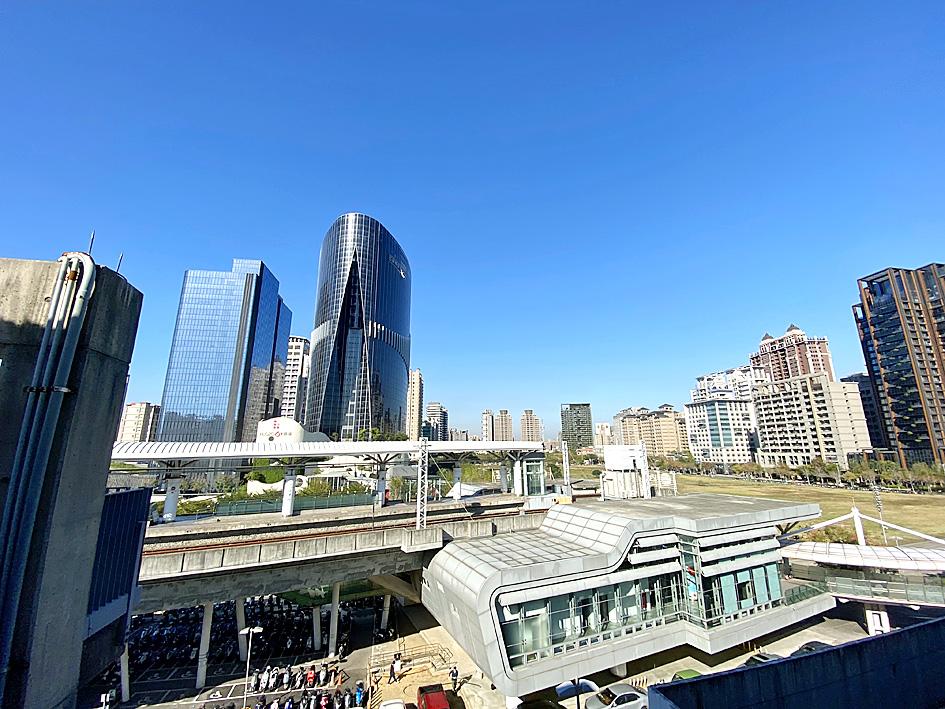Housing prices picked up nationwide last year, supported by an economic boom, excessive liquidity and low interest rates, but the population is shrinking, which is unfavorable for the property market in the long run, analysts said yesterday.
Taiwan’s population stood at 23,375,314 last year, contracting 1 percent, or 228,000, after mortality rates officially overtook birthrates in 2020.
The populations in the special municipalities of Taipei, New Taipei City, Taichung, Tainan and Kaohsiung declined by a combined total of 181,194, H&B Realty Co (住商不動產) said, citing Ministry of Interior data.

Photo: Hsu Yi-ping, Taipei Times
Taipei lost the most people at 118,484, followed by Kaohsiung (29,880), Tainan (18,157), New Taipei City (12,459) and Taichung (2,214), said H&B, the nation’s largest house broker by the number of franchises.
Taoyuan was the exception, with a 1 percent gain, or 21,437 people, it said.
However, the demographic changes did not hinder a rise in home prices, with increases of 18.5 percent in Tainan, 17.6 percent in Kaohsiung, 14.1 percent in Taichung, 7.7 percent in Taoyuan, 7 percent in Taipei and 5.4 percent in New Taipei City, H&B research head Jessica Hsu (徐佳馨) said.
“The price hikes last year challenge conventional beliefs that population is the most critical fundamental to gauge the property market and that population losses for any reasons bode ill for housing prices,” Hsu said in a report.
One explanation could be that Taiwan’s low fertility rate boosted the number of small households and supported real demand, Hsu said.
Despite the population decline, the number of households increased 1.9 percent to 9,006,580, she said.
The rise in the proportion of small families might also explain why two-bedroom apartments have become mainstream products, she said.
International reports show that people assign more importance to health and well-being amid the COVID-19 pandemic and are willing to live in less populous areas to avoid crowds, she said, adding that remote working has made migrating to suburban locations more feasible.
Global monetary easing has encouraged property purchases as a hedge against inflation, Hsu said.
Mandy Lang (郎美囡), lead researcher at Great Home Realty Co (大家房屋), said that an improving outlook for the job market in southern Taiwan has bolstered housing prices in Tainan and Kaohsiung.
Taiwan Semiconductor Manufacturing Co (台積電) facilities that are being built in the two cities have prompted developers to construct new residential complexes in the hope of selling them to TSMC employees, Lang said.
Cushman & Wakefield Taiwan managing director Billy Yen (顏炳立) said that housing prices in southern Taiwan have soared 30 percent following TSMC’s capacity expansion announcements.

SELL-OFF: Investors expect tariff-driven volatility as the local boarse reopens today, while analysts say government support and solid fundamentals would steady sentiment Local investors are bracing for a sharp market downturn today as the nation’s financial markets resume trading following a two-day closure for national holidays before the weekend, with sentiment rattled by US President Donald Trump’s sweeping tariff announcement. Trump’s unveiling of new “reciprocal tariffs” on Wednesday triggered a sell-off in global markets, with the FTSE Taiwan Index Futures — a benchmark for Taiwanese equities traded in Singapore — tumbling 9.2 percent over the past two sessions. Meanwhile, the American depositary receipts (ADRs) of Taiwan Semiconductor Manufacturing Co (TSMC, 台積電), the most heavily weighted stock on the TAIEX, plunged 13.8 percent in

A wave of stop-loss selling and panic selling hit Taiwan's stock market at its opening today, with the weighted index plunging 2,086 points — a drop of more than 9.7 percent — marking the largest intraday point and percentage loss on record. The index bottomed out at 19,212.02, while futures were locked limit-down, with more than 1,000 stocks hitting their daily drop limit. Three heavyweight stocks — Taiwan Semiconductor Manufacturing Co (TSMC, 台積電), Hon Hai Precision Industry Co (Foxconn, 鴻海精密) and MediaTek (聯發科) — hit their limit-down prices as soon as the market opened, falling to NT$848 (US$25.54), NT$138.5 and NT$1,295 respectively. TSMC's

TARIFFS: The global ‘panic atmosphere remains strong,’ and foreign investors have continued to sell their holdings since the start of the year, the Ministry of Finance said The government yesterday authorized the activation of its NT$500 billion (US$15.15 billion) National Stabilization Fund (NSF) to prop up the local stock market after two days of sharp falls in reaction to US President Donald Trump’s new import tariffs. The Ministry of Finance said in a statement after the market close that the steering committee of the fund had been given the go-ahead to intervene in the market to bolster Taiwanese shares in a time of crisis. The fund has been authorized to use its assets “to carry out market stabilization tasks as appropriate to maintain the stability of Taiwan’s

In a small town in Paraguay, a showdown is brewing between traditional producers of yerba mate, a bitter herbal tea popular across South America, and miners of a shinier treasure: gold. A rush for the precious metal is pitting mate growers and indigenous groups against the expanding operations of small-scale miners who, until recently, were their neighbors, not nemeses. “They [the miners] have destroyed everything... The canals, springs, swamps,” said Vidal Britez, president of the Yerba Mate Producers’ Association of the town of Paso Yobai, about 210km east of capital Asuncion. “You can see the pollution from the dead fish.